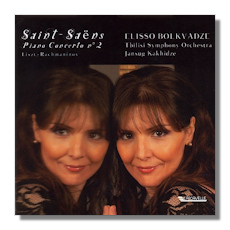
The Internet's Premier Classical Music Source
Related Links
-
Liszt Reviews
Rachmaninoff Reviews
Saint-Saëns Reviews - Latest Reviews
- More Reviews
-
By Composer
-
Collections
DVD & Blu-ray
Books
Concert Reviews
Articles/Interviews
Software
Audio
Search Amazon
Recommended Links
Site News
 CD Review
CD Review
Elisso Bolkvadze Plays

- Camille Saint-Saëns: Piano Concerto #2, in G minor, Op. 22
- Franz Liszt: Fantasy on Hungarian Folk Themes, S. 123
- Sergei Rachmaninoff: Rhapsody on a Theme of Paganini, Op. 43
Elisso Bolkvadze, piano
Tbilisi Symphony Orchestra/Jansug Kakhidze
Cascavelle VCL3151
The Saint-Saëns Second is the composer's most popular of his five piano concertos. It's easy to see why: the stormy first movement (Andante sostenuto) is full of drama and features a haunting main theme, while the ensuing Allegro scherzando offers one of Saint-Saëns' most catchy and joyous melodies. The presto finale effervesces with unbounded energy and brilliant, rippling piano writing. All those characteristics emerge in this recording with a sense of mastery by the brilliant Georgian pianist, Elisso Bolkvadze. She catches all the drama and lyricism in the first movement with both a keen sensitivity for the melting Romantic lyricism and an almost fiendish intensity for the dark and dramatic moments. Her way of contrasting these often disparate elements at times points up this work's kinship with the music of Chopin and Liszt.
Her second movement takes us to a brighter world, where the music under her fingers sparkles in the main theme and then turns deliciously carefree in the bouncy zest of the famous alternate melody. Her account is simply a delight. The finale brims with energy, and while the mood is light, there is also a darker sense here, especially in those powerful tolling chords near the end. All in all, this is a more dramatic and, in the end, more effective reading of this closing movement than what many listeners might be accustomed to. The orchestra plays well throughout the concerto under the baton of Jansug Kakhidze and the sound of the piano is close up and very detailed. There is a lot of reverberation in the orchestral sonorities, but everything still emerges clearly.
For those who are fans of the Liszt Hungarian Fantasy (an arrangement of his Hungarian Rhapsody #14), they will be pleased that Bolkvadze delivers an exciting performance of it. She is fully up to the considerable technical demands of this work and she makes the most of Liszt's exotic lyricism and deft sense for folk themes. It's hard, of course, to overlook the work's bombastic character and Bolkvadze wisely doesn't attempt to tone it down. Neither does Kakhidze (listen to the brass sonorities ring out), and thus both soloist and orchestra unite to present the work as Liszt wanted it. In the end, this must be regarded as one of the better accounts of this work, where the Hungarian flavors come through with a genuine folkish sense, and the brilliance and virtuosity of the writing are thrilling to hear. Again, the sound is excellent but with much reverberation.
The Rachmaninov Rhapsody, while billed third here, is perhaps the most compelling work on the disc. More importantly, Bolkvadze delivers a stunning performance of it. For once, we have a pianist who not only captures both the menace of the piece (try variations 7, 8 and 9), but also the playfulness (variations 2 and 15). She also brilliantly points up the restlessness of the 17th variation and convincingly delivers the ecstatic lyricism of the famous 18th variation. While the orchestra sounds a little scrawny at times and lacks a little energy in the 14th variation, for the most part they play well. The sound, despite the reverberation, is clear and powerful.
Elisso Bolkvadze, a student of Tatiana Nikolaeva and Lev Naoumov, made these recordings in 1993 (Liszt) and 1994 (Saint-Saëns and Rachmaninov). Cascavelle reissued them in 2011. Among the many fine performances of the Rachmaninov Rhapsody, which include Ashkenazy, Cliburn, Rubinstein, and scores of others, this one by Bolkvadze can stand with the better ones, at least from a pianistic point of view. Bolkvadze's Saint-Saëns too, with efforts by Rubinstein, Tacchino, and others, can also stand comparison with the finer performances. I can write "ditto" as well for the Liszt, even though I must point out that Michel Beroff's 1980 recording on EMI is also a mighty convincing effort. In any event, perhaps this disc by Bolkvadze will pave the way for future recordings from her. Clearly, she is an enormously talented pianist worthy of further attention.
Copyright © 2012, Robert Cummings





















